Criminal Procedure and Law: Arrest Procedures, Offences, and Laws
VerifiedAdded on 2020/05/28
|9
|1464
|84
Report
AI Summary
This report provides a detailed analysis of criminal procedure and law in Singapore, with a specific focus on the process of arrest. It begins by defining arrest and its purpose within the legal framework. The report then outlines the arrestable offenses under the Penal Code and other relevant acts, such as the Arms Offences Act and the Misuse of Drugs Act. It meticulously explains the police arrest procedure, differentiating between arrest with and without a warrant, and the circumstances under which each is applicable. The report also addresses the rights of citizens to arrest offenders and the subsequent procedures. Furthermore, the report delves into the specifics of arrest, including the powers of police officers, the conditions for detention, and the rights of the arrested person, such as the right to consult with a legal practitioner. The report concludes with a summary of the legal framework and its implications for both law enforcement and citizens.
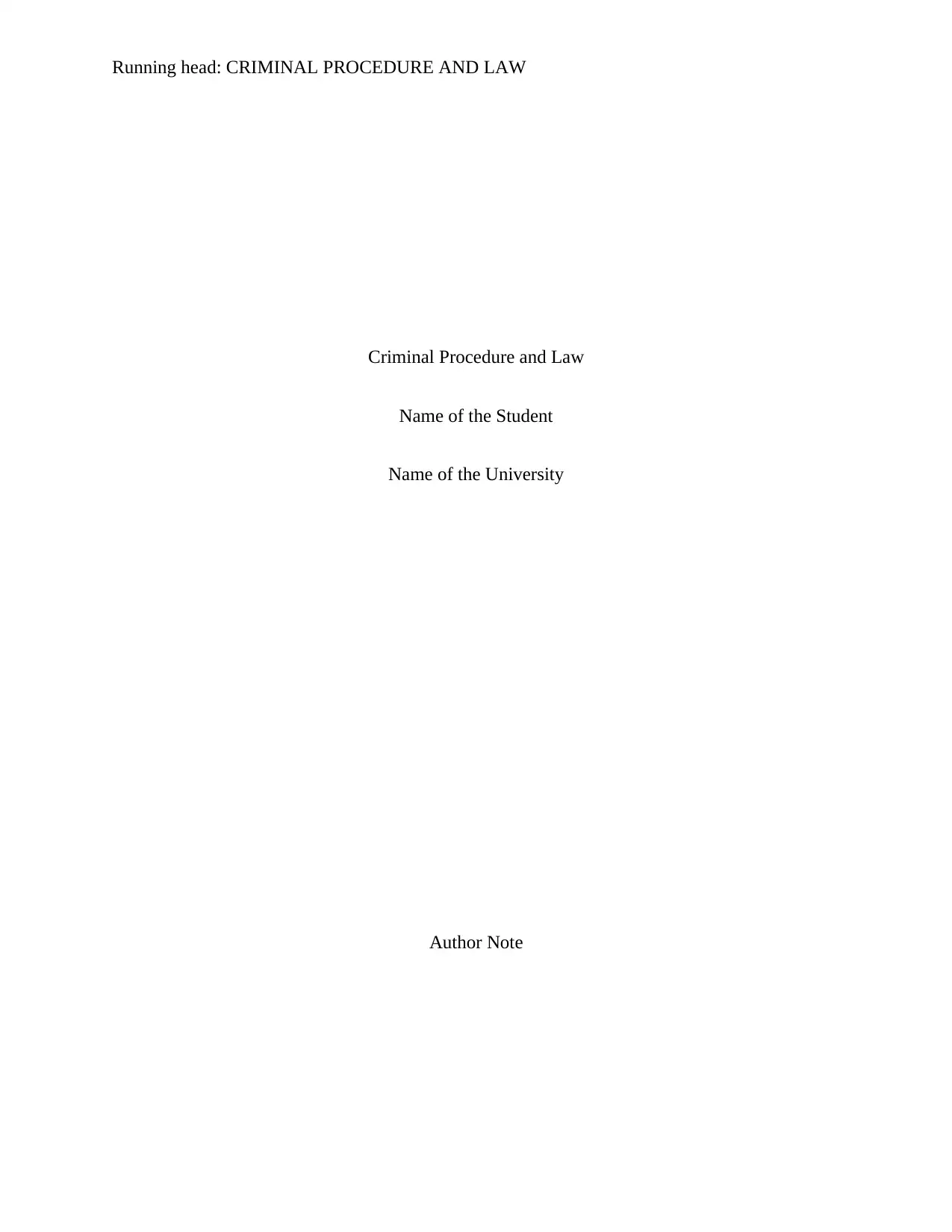
Running head: CRIMINAL PROCEDURE AND LAW
Criminal Procedure and Law
Name of the Student
Name of the University
Author Note
Criminal Procedure and Law
Name of the Student
Name of the University
Author Note
Paraphrase This Document
Need a fresh take? Get an instant paraphrase of this document with our AI Paraphraser
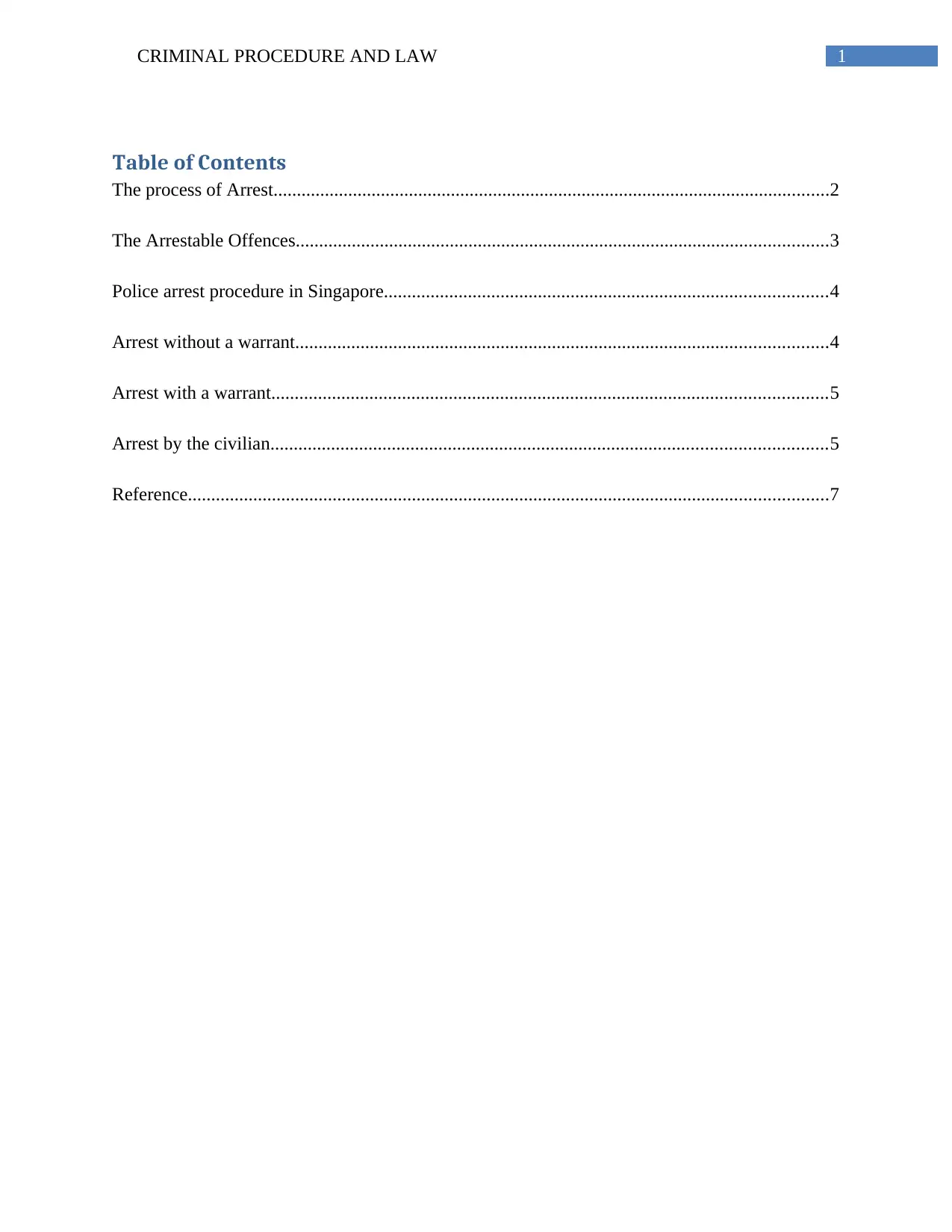
1CRIMINAL PROCEDURE AND LAW
Table of Contents
The process of Arrest.......................................................................................................................2
The Arrestable Offences..................................................................................................................3
Police arrest procedure in Singapore...............................................................................................4
Arrest without a warrant..................................................................................................................4
Arrest with a warrant.......................................................................................................................5
Arrest by the civilian.......................................................................................................................5
Reference.........................................................................................................................................7
Table of Contents
The process of Arrest.......................................................................................................................2
The Arrestable Offences..................................................................................................................3
Police arrest procedure in Singapore...............................................................................................4
Arrest without a warrant..................................................................................................................4
Arrest with a warrant.......................................................................................................................5
Arrest by the civilian.......................................................................................................................5
Reference.........................................................................................................................................7
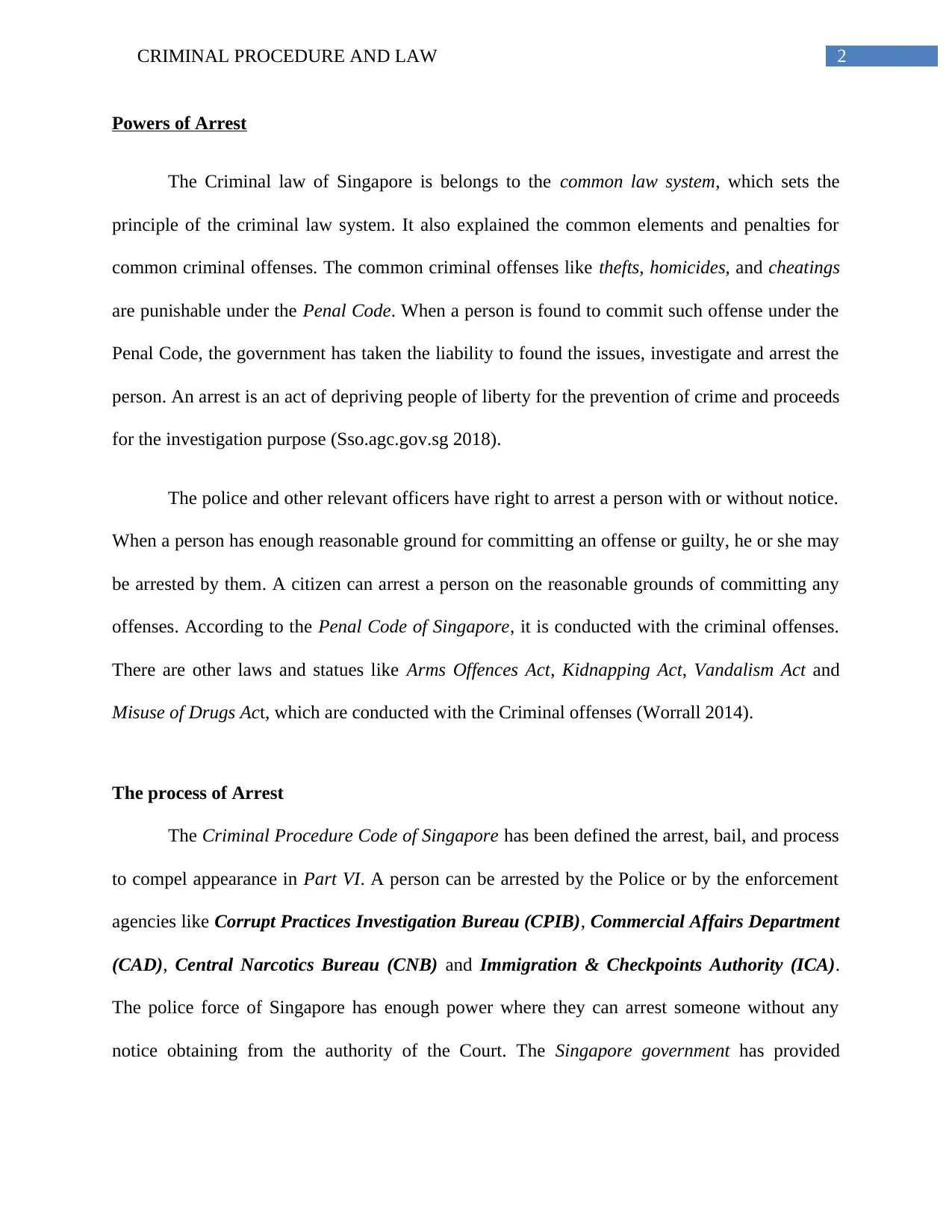
2CRIMINAL PROCEDURE AND LAW
Powers of Arrest
The Criminal law of Singapore is belongs to the common law system, which sets the
principle of the criminal law system. It also explained the common elements and penalties for
common criminal offenses. The common criminal offenses like thefts, homicides, and cheatings
are punishable under the Penal Code. When a person is found to commit such offense under the
Penal Code, the government has taken the liability to found the issues, investigate and arrest the
person. An arrest is an act of depriving people of liberty for the prevention of crime and proceeds
for the investigation purpose (Sso.agc.gov.sg 2018).
The police and other relevant officers have right to arrest a person with or without notice.
When a person has enough reasonable ground for committing an offense or guilty, he or she may
be arrested by them. A citizen can arrest a person on the reasonable grounds of committing any
offenses. According to the Penal Code of Singapore, it is conducted with the criminal offenses.
There are other laws and statues like Arms Offences Act, Kidnapping Act, Vandalism Act and
Misuse of Drugs Act, which are conducted with the Criminal offenses (Worrall 2014).
The process of Arrest
The Criminal Procedure Code of Singapore has been defined the arrest, bail, and process
to compel appearance in Part VI. A person can be arrested by the Police or by the enforcement
agencies like Corrupt Practices Investigation Bureau (CPIB), Commercial Affairs Department
(CAD), Central Narcotics Bureau (CNB) and Immigration & Checkpoints Authority (ICA).
The police force of Singapore has enough power where they can arrest someone without any
notice obtaining from the authority of the Court. The Singapore government has provided
Powers of Arrest
The Criminal law of Singapore is belongs to the common law system, which sets the
principle of the criminal law system. It also explained the common elements and penalties for
common criminal offenses. The common criminal offenses like thefts, homicides, and cheatings
are punishable under the Penal Code. When a person is found to commit such offense under the
Penal Code, the government has taken the liability to found the issues, investigate and arrest the
person. An arrest is an act of depriving people of liberty for the prevention of crime and proceeds
for the investigation purpose (Sso.agc.gov.sg 2018).
The police and other relevant officers have right to arrest a person with or without notice.
When a person has enough reasonable ground for committing an offense or guilty, he or she may
be arrested by them. A citizen can arrest a person on the reasonable grounds of committing any
offenses. According to the Penal Code of Singapore, it is conducted with the criminal offenses.
There are other laws and statues like Arms Offences Act, Kidnapping Act, Vandalism Act and
Misuse of Drugs Act, which are conducted with the Criminal offenses (Worrall 2014).
The process of Arrest
The Criminal Procedure Code of Singapore has been defined the arrest, bail, and process
to compel appearance in Part VI. A person can be arrested by the Police or by the enforcement
agencies like Corrupt Practices Investigation Bureau (CPIB), Commercial Affairs Department
(CAD), Central Narcotics Bureau (CNB) and Immigration & Checkpoints Authority (ICA).
The police force of Singapore has enough power where they can arrest someone without any
notice obtaining from the authority of the Court. The Singapore government has provided
⊘ This is a preview!⊘
Do you want full access?
Subscribe today to unlock all pages.

Trusted by 1+ million students worldwide
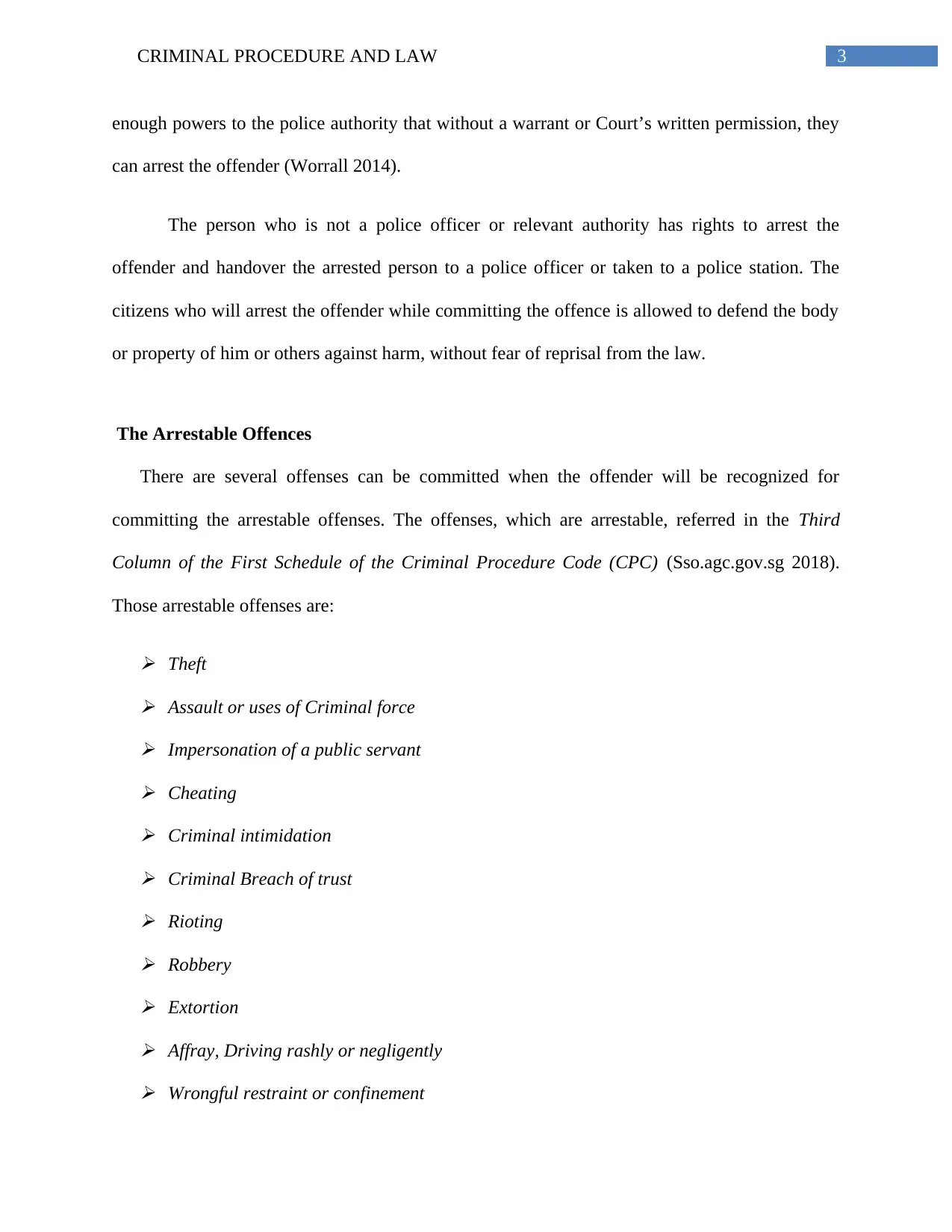
3CRIMINAL PROCEDURE AND LAW
enough powers to the police authority that without a warrant or Court’s written permission, they
can arrest the offender (Worrall 2014).
The person who is not a police officer or relevant authority has rights to arrest the
offender and handover the arrested person to a police officer or taken to a police station. The
citizens who will arrest the offender while committing the offence is allowed to defend the body
or property of him or others against harm, without fear of reprisal from the law.
The Arrestable Offences
There are several offenses can be committed when the offender will be recognized for
committing the arrestable offenses. The offenses, which are arrestable, referred in the Third
Column of the First Schedule of the Criminal Procedure Code (CPC) (Sso.agc.gov.sg 2018).
Those arrestable offenses are:
Theft Assault or uses of Criminal force Impersonation of a public servant Cheating Criminal intimidation Criminal Breach of trust Rioting Robbery Extortion Affray, Driving rashly or negligently Wrongful restraint or confinement
enough powers to the police authority that without a warrant or Court’s written permission, they
can arrest the offender (Worrall 2014).
The person who is not a police officer or relevant authority has rights to arrest the
offender and handover the arrested person to a police officer or taken to a police station. The
citizens who will arrest the offender while committing the offence is allowed to defend the body
or property of him or others against harm, without fear of reprisal from the law.
The Arrestable Offences
There are several offenses can be committed when the offender will be recognized for
committing the arrestable offenses. The offenses, which are arrestable, referred in the Third
Column of the First Schedule of the Criminal Procedure Code (CPC) (Sso.agc.gov.sg 2018).
Those arrestable offenses are:
Theft Assault or uses of Criminal force Impersonation of a public servant Cheating Criminal intimidation Criminal Breach of trust Rioting Robbery Extortion Affray, Driving rashly or negligently Wrongful restraint or confinement
Paraphrase This Document
Need a fresh take? Get an instant paraphrase of this document with our AI Paraphraser
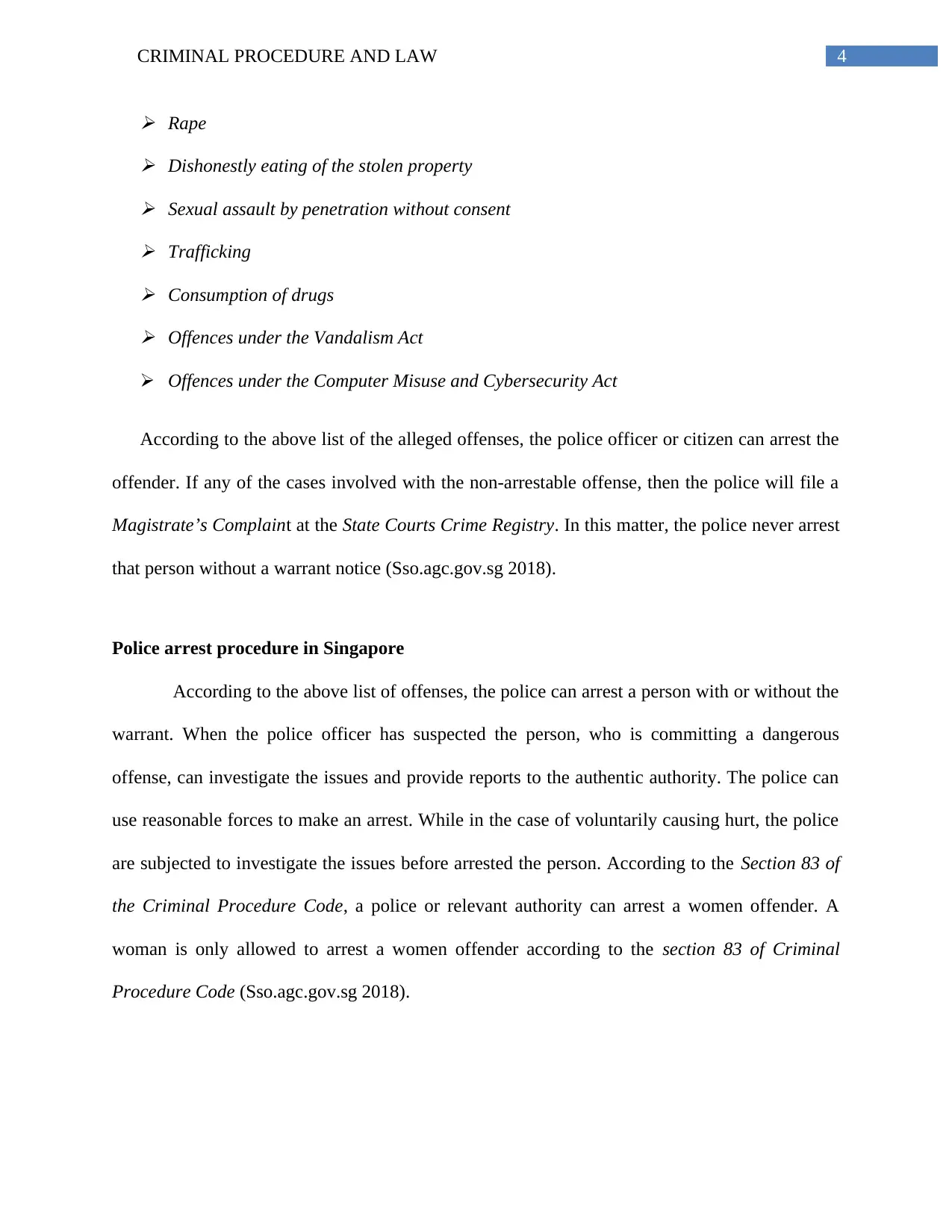
4CRIMINAL PROCEDURE AND LAW
Rape Dishonestly eating of the stolen property Sexual assault by penetration without consent Trafficking Consumption of drugs Offences under the Vandalism Act
Offences under the Computer Misuse and Cybersecurity Act
According to the above list of the alleged offenses, the police officer or citizen can arrest the
offender. If any of the cases involved with the non-arrestable offense, then the police will file a
Magistrate’s Complaint at the State Courts Crime Registry. In this matter, the police never arrest
that person without a warrant notice (Sso.agc.gov.sg 2018).
Police arrest procedure in Singapore
According to the above list of offenses, the police can arrest a person with or without the
warrant. When the police officer has suspected the person, who is committing a dangerous
offense, can investigate the issues and provide reports to the authentic authority. The police can
use reasonable forces to make an arrest. While in the case of voluntarily causing hurt, the police
are subjected to investigate the issues before arrested the person. According to the Section 83 of
the Criminal Procedure Code, a police or relevant authority can arrest a women offender. A
woman is only allowed to arrest a women offender according to the section 83 of Criminal
Procedure Code (Sso.agc.gov.sg 2018).
Rape Dishonestly eating of the stolen property Sexual assault by penetration without consent Trafficking Consumption of drugs Offences under the Vandalism Act
Offences under the Computer Misuse and Cybersecurity Act
According to the above list of the alleged offenses, the police officer or citizen can arrest the
offender. If any of the cases involved with the non-arrestable offense, then the police will file a
Magistrate’s Complaint at the State Courts Crime Registry. In this matter, the police never arrest
that person without a warrant notice (Sso.agc.gov.sg 2018).
Police arrest procedure in Singapore
According to the above list of offenses, the police can arrest a person with or without the
warrant. When the police officer has suspected the person, who is committing a dangerous
offense, can investigate the issues and provide reports to the authentic authority. The police can
use reasonable forces to make an arrest. While in the case of voluntarily causing hurt, the police
are subjected to investigate the issues before arrested the person. According to the Section 83 of
the Criminal Procedure Code, a police or relevant authority can arrest a women offender. A
woman is only allowed to arrest a women offender according to the section 83 of Criminal
Procedure Code (Sso.agc.gov.sg 2018).
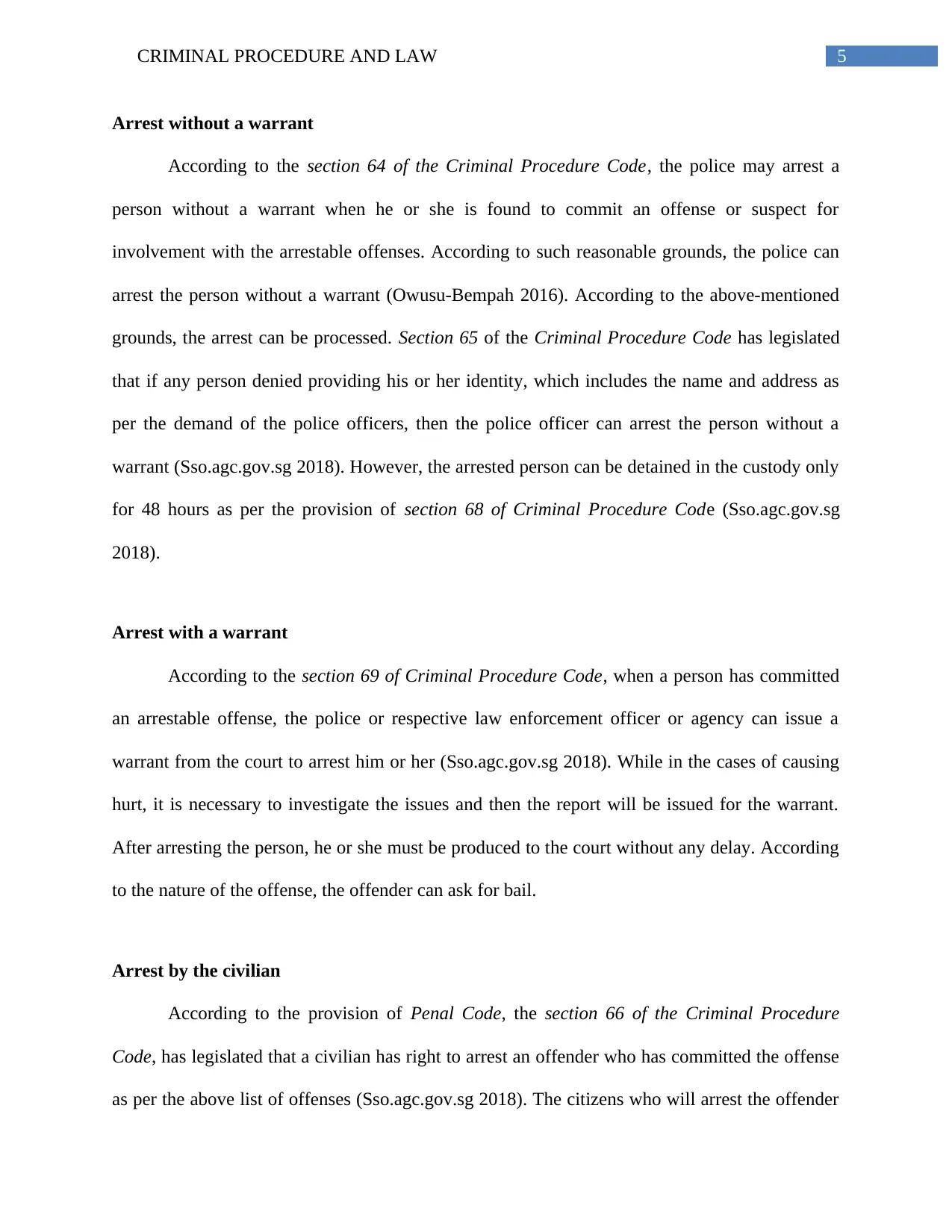
5CRIMINAL PROCEDURE AND LAW
Arrest without a warrant
According to the section 64 of the Criminal Procedure Code, the police may arrest a
person without a warrant when he or she is found to commit an offense or suspect for
involvement with the arrestable offenses. According to such reasonable grounds, the police can
arrest the person without a warrant (Owusu-Bempah 2016). According to the above-mentioned
grounds, the arrest can be processed. Section 65 of the Criminal Procedure Code has legislated
that if any person denied providing his or her identity, which includes the name and address as
per the demand of the police officers, then the police officer can arrest the person without a
warrant (Sso.agc.gov.sg 2018). However, the arrested person can be detained in the custody only
for 48 hours as per the provision of section 68 of Criminal Procedure Code (Sso.agc.gov.sg
2018).
Arrest with a warrant
According to the section 69 of Criminal Procedure Code, when a person has committed
an arrestable offense, the police or respective law enforcement officer or agency can issue a
warrant from the court to arrest him or her (Sso.agc.gov.sg 2018). While in the cases of causing
hurt, it is necessary to investigate the issues and then the report will be issued for the warrant.
After arresting the person, he or she must be produced to the court without any delay. According
to the nature of the offense, the offender can ask for bail.
Arrest by the civilian
According to the provision of Penal Code, the section 66 of the Criminal Procedure
Code, has legislated that a civilian has right to arrest an offender who has committed the offense
as per the above list of offenses (Sso.agc.gov.sg 2018). The citizens who will arrest the offender
Arrest without a warrant
According to the section 64 of the Criminal Procedure Code, the police may arrest a
person without a warrant when he or she is found to commit an offense or suspect for
involvement with the arrestable offenses. According to such reasonable grounds, the police can
arrest the person without a warrant (Owusu-Bempah 2016). According to the above-mentioned
grounds, the arrest can be processed. Section 65 of the Criminal Procedure Code has legislated
that if any person denied providing his or her identity, which includes the name and address as
per the demand of the police officers, then the police officer can arrest the person without a
warrant (Sso.agc.gov.sg 2018). However, the arrested person can be detained in the custody only
for 48 hours as per the provision of section 68 of Criminal Procedure Code (Sso.agc.gov.sg
2018).
Arrest with a warrant
According to the section 69 of Criminal Procedure Code, when a person has committed
an arrestable offense, the police or respective law enforcement officer or agency can issue a
warrant from the court to arrest him or her (Sso.agc.gov.sg 2018). While in the cases of causing
hurt, it is necessary to investigate the issues and then the report will be issued for the warrant.
After arresting the person, he or she must be produced to the court without any delay. According
to the nature of the offense, the offender can ask for bail.
Arrest by the civilian
According to the provision of Penal Code, the section 66 of the Criminal Procedure
Code, has legislated that a civilian has right to arrest an offender who has committed the offense
as per the above list of offenses (Sso.agc.gov.sg 2018). The citizens who will arrest the offender
⊘ This is a preview!⊘
Do you want full access?
Subscribe today to unlock all pages.

Trusted by 1+ million students worldwide
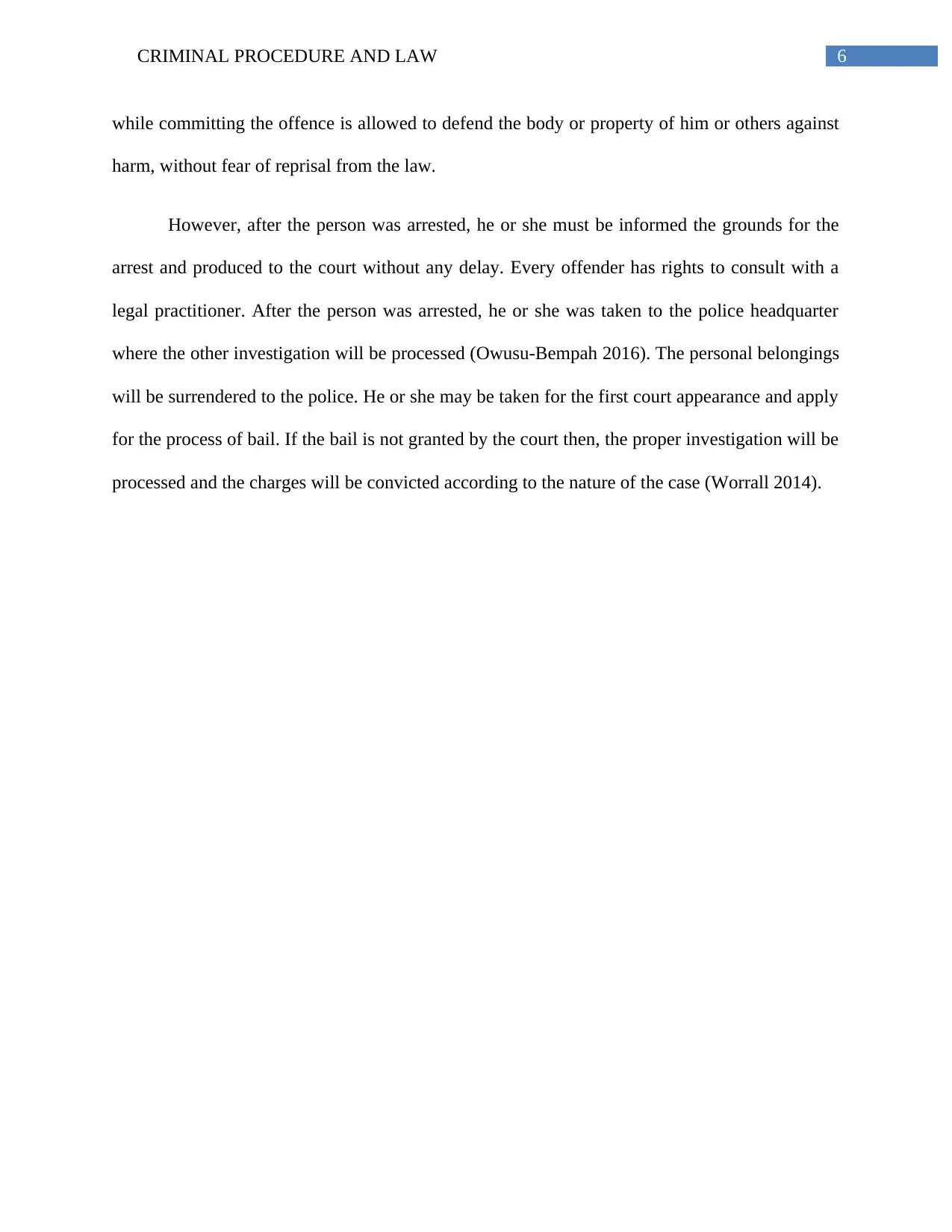
6CRIMINAL PROCEDURE AND LAW
while committing the offence is allowed to defend the body or property of him or others against
harm, without fear of reprisal from the law.
However, after the person was arrested, he or she must be informed the grounds for the
arrest and produced to the court without any delay. Every offender has rights to consult with a
legal practitioner. After the person was arrested, he or she was taken to the police headquarter
where the other investigation will be processed (Owusu-Bempah 2016). The personal belongings
will be surrendered to the police. He or she may be taken for the first court appearance and apply
for the process of bail. If the bail is not granted by the court then, the proper investigation will be
processed and the charges will be convicted according to the nature of the case (Worrall 2014).
while committing the offence is allowed to defend the body or property of him or others against
harm, without fear of reprisal from the law.
However, after the person was arrested, he or she must be informed the grounds for the
arrest and produced to the court without any delay. Every offender has rights to consult with a
legal practitioner. After the person was arrested, he or she was taken to the police headquarter
where the other investigation will be processed (Owusu-Bempah 2016). The personal belongings
will be surrendered to the police. He or she may be taken for the first court appearance and apply
for the process of bail. If the bail is not granted by the court then, the proper investigation will be
processed and the charges will be convicted according to the nature of the case (Worrall 2014).
Paraphrase This Document
Need a fresh take? Get an instant paraphrase of this document with our AI Paraphraser
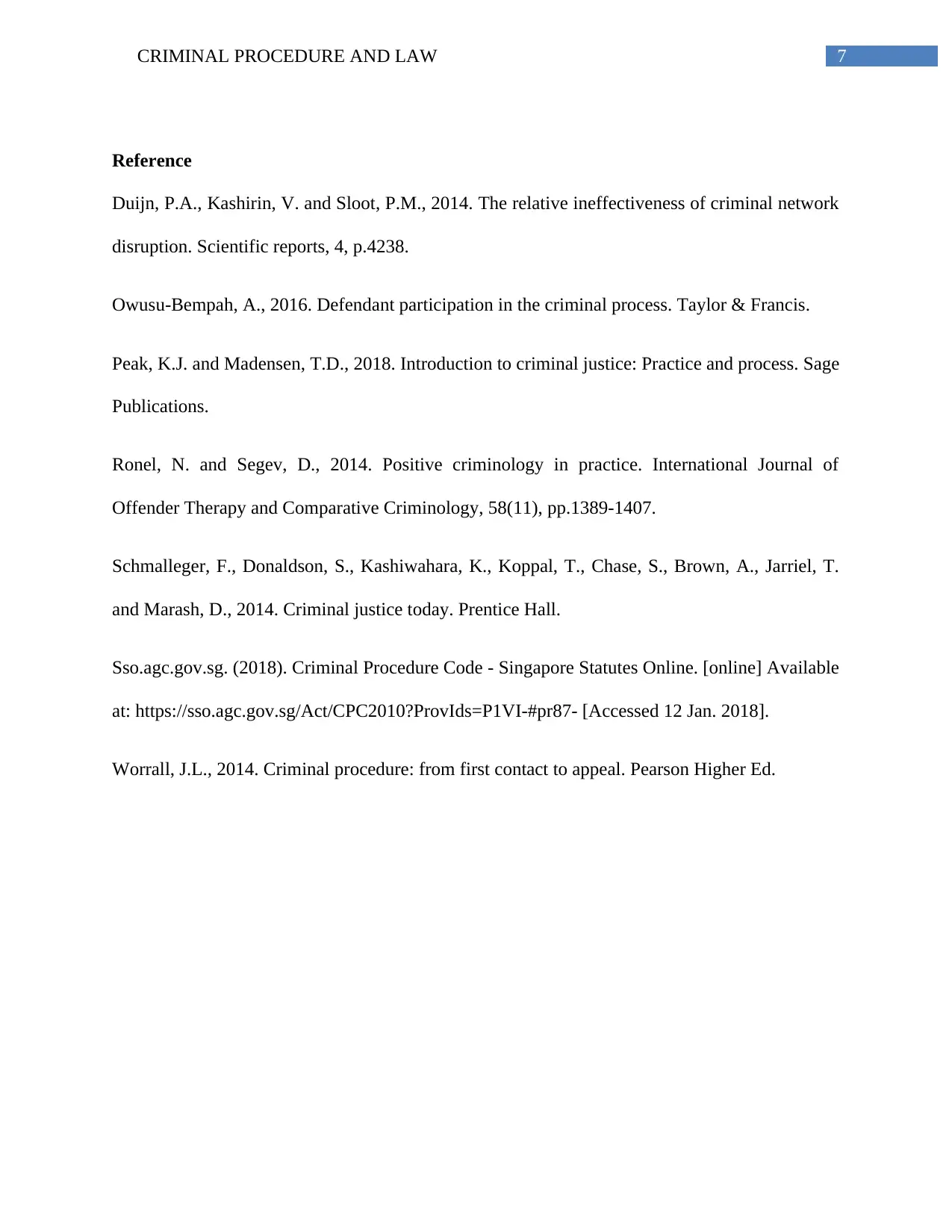
7CRIMINAL PROCEDURE AND LAW
Reference
Duijn, P.A., Kashirin, V. and Sloot, P.M., 2014. The relative ineffectiveness of criminal network
disruption. Scientific reports, 4, p.4238.
Owusu-Bempah, A., 2016. Defendant participation in the criminal process. Taylor & Francis.
Peak, K.J. and Madensen, T.D., 2018. Introduction to criminal justice: Practice and process. Sage
Publications.
Ronel, N. and Segev, D., 2014. Positive criminology in practice. International Journal of
Offender Therapy and Comparative Criminology, 58(11), pp.1389-1407.
Schmalleger, F., Donaldson, S., Kashiwahara, K., Koppal, T., Chase, S., Brown, A., Jarriel, T.
and Marash, D., 2014. Criminal justice today. Prentice Hall.
Sso.agc.gov.sg. (2018). Criminal Procedure Code - Singapore Statutes Online. [online] Available
at: https://sso.agc.gov.sg/Act/CPC2010?ProvIds=P1VI-#pr87- [Accessed 12 Jan. 2018].
Worrall, J.L., 2014. Criminal procedure: from first contact to appeal. Pearson Higher Ed.
Reference
Duijn, P.A., Kashirin, V. and Sloot, P.M., 2014. The relative ineffectiveness of criminal network
disruption. Scientific reports, 4, p.4238.
Owusu-Bempah, A., 2016. Defendant participation in the criminal process. Taylor & Francis.
Peak, K.J. and Madensen, T.D., 2018. Introduction to criminal justice: Practice and process. Sage
Publications.
Ronel, N. and Segev, D., 2014. Positive criminology in practice. International Journal of
Offender Therapy and Comparative Criminology, 58(11), pp.1389-1407.
Schmalleger, F., Donaldson, S., Kashiwahara, K., Koppal, T., Chase, S., Brown, A., Jarriel, T.
and Marash, D., 2014. Criminal justice today. Prentice Hall.
Sso.agc.gov.sg. (2018). Criminal Procedure Code - Singapore Statutes Online. [online] Available
at: https://sso.agc.gov.sg/Act/CPC2010?ProvIds=P1VI-#pr87- [Accessed 12 Jan. 2018].
Worrall, J.L., 2014. Criminal procedure: from first contact to appeal. Pearson Higher Ed.

8CRIMINAL PROCEDURE AND LAW
⊘ This is a preview!⊘
Do you want full access?
Subscribe today to unlock all pages.

Trusted by 1+ million students worldwide
1 out of 9
Related Documents
Your All-in-One AI-Powered Toolkit for Academic Success.
+13062052269
info@desklib.com
Available 24*7 on WhatsApp / Email
![[object Object]](/_next/static/media/star-bottom.7253800d.svg)
Unlock your academic potential
Copyright © 2020–2025 A2Z Services. All Rights Reserved. Developed and managed by ZUCOL.





